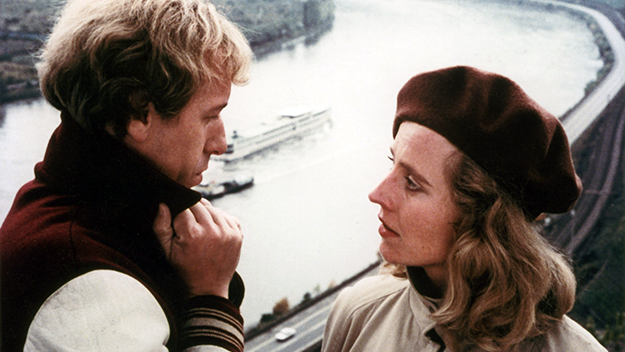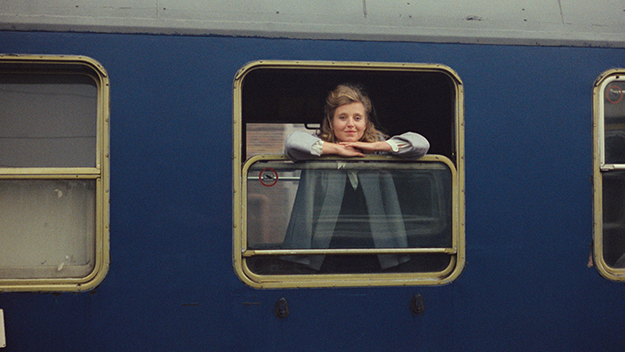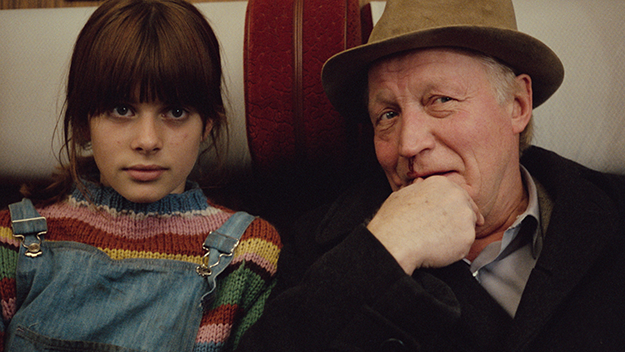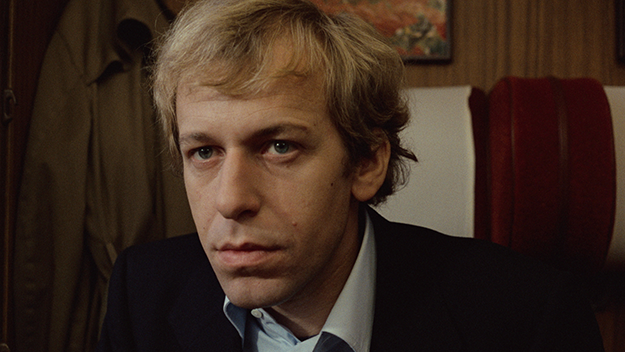Film of the Week: Wrong Move
Wim Wenders once said of his film Wrong Move (Falsche Bewegung) that it was about “how to be able to grasp the world through language.” He may or may not have specifically meant words, written or spoken, but verbal communication certainly comes thick and fast in this 1975 feature, now reissued in a 4K restoration. It’s a film dense with philosophizing and speechifying, and the most thoroughly literary of all Wenders’s films. It was scripted by playwright, novelist, and sometime director Peter Handke, who had previously written Wenders’s The Goalie’s Anxiety at the Penalty Kick (72), and it was a loose adaptation of Goethe’s 1790s novel Wilhelm Meister’s Apprenticeship.
We tend to think of Wenders as a romantic filmmaker, especially since Wings of Desire (87), when a certain gauche sentimentality starts getting the better of him. But in the alluringly dream-like Wrong Move, he shows himself to be a true German Romantic, with a capital R, paying homage to the most archetypal Romantic literary genre, the Bildungsroman, or novel of apprenticeship. In Goethe’s story, a young man who dreams of being a writer sets out on the road, takes up with some theatrical types and tests his dreams against the bitter limitations of reality. And that’s exactly what happens in Wenders’s film, although the reality of 1970s Germany has a harshness that seems fated to destroy his hero’s dreams, if not make them seem derisory. It may be a bleak film in text, however, but it’s hardly bleak visually, the glummer vistas that Wilhelm visits being offset by the neon vividness of much of Robby Müller’s photography, especially with its burnished gold yellows.
There are moments when we wonder whether Wenders’s modern Wilhelm (from which name “Wim” is derived) is for real. And perhaps it’s a little harder in 2016 to accept a hero who dreamily declares that he wants “to write! To write!” Whether in film or in literature, the “blocked writer” narrative—of which Wenders’s previous feature Alice in the Cities (74) was an example—has decidedly fallen from fashion. Indeed, there’s a distinct ironic distance at work between the late 18th-century genius-to-be archetype and the antihero that Wenders presents us with: a sullen small-town brooder, by turns taciturn and verbose, played by the director’s regular alter ego Rüdiger Vogler, who’s first seen sticking his fist through his bedroom window for no clear reason, after listening to a burst of the Troggs. It’s hard also not to think that Wilhelm (Vogler was then in his early thirties) is a little old for such petulant proto-punk gestures, or indeed to be still dreaming of putting pen to paper. And surely, even by the standards of early ’70s German fashion, Wilhelm is intended to look somewhat ridiculous in his reindeer-knit sweater?
It’s certainly a rum journey south that he undertakes, from his hometown of Glückstadt on the Elbe to Germany’s highest mountain, the Zugspitze. His mother (Marianne Hoppe), who’s sold her property to a supermarket, sends him on his way with encouragement to write, and he gets on a train—first stop Hamburg—to find a silent young girl (Nastassja Kinski) staring at him mysteriously. She’s accompanied by a mysterious harmonica-playing elderly man, Laertes (Hans Christian Blech), and both are avatars of characters from Goethe’s novel; in fact, Wilhelm expresses surprise to hear that she’s called Mignon, as if realizing that he’s fallen into a piece of literature. Meanwhile, he exchanges gazes with an alluring woman who’s standing on a station platform kitted out like a ’40s femme fatale: she’s actress Therese Farner (Hanna Schygulla), and although she’s taking another train (observed drawing away, in an elegantly extended travelling shot), she’ll almost magically reconnect with Wilhelm later.
Everything in Wrong Move happens as if by magic—or as if previously written in the pages of another book. While situated in a mundanely real modern Germany, the narrative is entirely anti-realistic. Wandering through the back streets of Bonn, where they observe various signs of local madness (“Do you have any idea what pain is?” screams a man from a nearby window), Wilhelm and his companions acquire the company of a portly, farcically inept Austrian poet, Bernhard Landau (Peter Kern), who later insists they join him at the mansion of his uncle. The incumbent turns out not to be his uncle after all (whoops, wrong mansion), but an industrialist (Ivan Desny) depressed after the death of his wife; the travelers stay there anyway. The next day, they all go for a long discursive stroll around the vineyards over the Rhine—one of the loci classici of German Romanticism… and so it goes on.
Without knowing Goethe’s novel, it’s hard to know exactly how the film relates to it—I’ve read a synopsis, and it appears that this version is narratively close in many ways. But knowing a certain type of cinema that does strange things with literary forebears, you can get a feel for Wenders’s and Handke’s strategy. In some ways, it’s the director’s Pierrot le Fou, a loose, ironically degraded modern wandering (the road movie is cinema’s equivalent of the literary pilgrimage or quest of yore). It channels and alludes to not just Goethe but also Faulkner, Flaubert’s Sentimental Education, and J.F. von Eichendorff’s 1826 novel Memoirs of a Good-for-Nothing (Wilhelm’s in-train reading) just as Godard channeled French pre-Romantic idyll Paul et Virginie in tandem with the lovers-on-the-run likes of Gun Crazy. In fact, as a close-but-not-that-close adaptation of a literary classic, Wrong Move is rather like Aki Kaurismäki’s Crime and Punishment (83) in the sense that the director has a copy of the novel in his pocket when he sets off, but the actual letter of the text gets left behind in the journey.
Wrong Move seems more about German history—both political and literary—than about anything else, with cinema seemingly taking a backseat as a preoccupation (notwithstanding clips of Straub and Huillet’s The Chronicle of Anna Magdalena Bach glimpsed on TV). The key figure in this respect is the affable, all-knowing Laertes. He first turns out to have been a runner in the 1936 Berlin Olympics, and admits he wouldn’t have shaken the hand of black athlete Jesse Owens; later he emerges as guilty of some major wartime crimes. The film seems explicitly a mapping of modern Germany as a landscape in which Romantic ideals and yearnings are bitterly degraded, if not devalued entirely, as witness the following speech by the non-uncle:
“I would like to speak briefly about loneliness in Germany. It seems to me that it is more hidden and at the same time more painful than elsewhere. Fear is considered a sign of vanity or it is felt as weakness. And that is why loneliness in Germany is masked, masked by all those treacherous, bright, soulless faces that drift through supermarkets, leisure centers, pedestrian precincts, keep-fit evening classes—the dead souls of Germany.”
Here in a nutshell are the theme and the backdrop of Wrong Move—and a token of the now hard-to-swallow snobbishness of ’70s counterculture. (You can’t quite believe in Desny’s establishment character voicing Wenders’s and Handke’s own insights: it seems a rather manipulative sort of ventriloquism.)
The wordiness of Wrong Move is also a little hard to swallow, but what’s clear, ironically, is that it’s really a film about film, and about the desire to film. Wilhelm admits he’s not much of an observer, but prides himself on having what he calls “an erotic gaze”—that is, he will see something he previously missed and get a feeling for it so that it finally becomes a part of him (is this akin, one wonders, to the “ecstatic truth” later proclaimed by Werner Herzog?).*
The script becomes most resonant when its literary cogitations seem most directly applicable to the act of filming. Just as Wilhelm wants to write but doesn’t know what, Wenders’s filmmaking has always been largely about the idea of setting forth, camera in hand, and finding (that is, defining, creating) the object you want to contemplate—Wilhelm says, “A person can write without knowing what… Like wanting to walk.” But the film highlights the difference between observing the world, and seeing it imaginatively, in the mind’s eye or through the camera lens. Wilhelm’s intermittent first-person voiceover kicks in during a car journey: “Sometimes I stared ahead for a long time purposely not looking at anything. Then I closed my eyes and only then, from the afterimage that was produced thereby, did I notice what had been in front of me.” This is all earnest, solemn stuff, and the film doesn’t seem to ironize it; it takes Therese to raise a self-reflexive laugh at the film’s expense when she wearily comments: “Something has to happen. Everything is so matter-of-fact… I feel like we’re putting things off. Let’s do something.”
After his prolix reflections on the contradiction between the personal and the political, Wilhelm does at last cut to the chase—and he does it with a camera in hand. He’s standing, back turned towards us, alone on the Zugspitze, resembling a mythic lonely wanderer in a Caspar David Friedrich paintings. But his education isn’t complete, and he’s still caught in self-absorbed lamentation: “It seemed to me as if I had missed something,” his voiceover continues, “as if I had always missed something with every new move.” And there the film ends—not abruptly, but with a fade to black like the slow fade on the end of a music track, and with Jürgen Knieper’s lugubrious noir-ish score, wreathed in languorous saxophone, playing on—as if the music’s never going to stop, and neither are Wilhelm’s, or Wim’s, travels. On an optimistic note, the road ahead of our wanderer leads directly to the altogether more ebullient journeyings of Kings of the Road; on a less hopeful one, it leads beyond that to the glum speculations of Wenders’s latter-day globetrotting fictions.
*For the record, I’ve always felt that Wenders is possessed of one of the consistently least erotic gazes in cinema—notwithstanding the somewhat creepy eroticization here of a then 14-year-old Nastassja Kinski. Oh well, as we seem to find ourselves saying more and more these days, it was the ’70s.
Jonathan Romney is a contributing editor to FILM COMMENT and writes its Film of the Week column. He is a member of the London Film Critics Circle.











